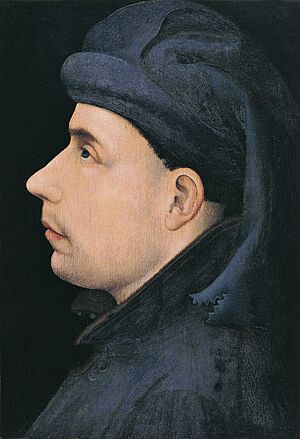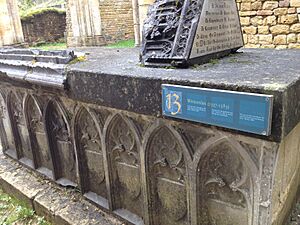Wenceslaus I, Duke of Luxembourg facts for kids
Quick facts for kids Wenceslaus I |
|
|---|---|

Wenceslaus I of Luxembourg
|
|
| Count of Luxembourg, Arlon and Durbuy | |
| Reign | 1353-13 March 1354 |
| Predecessor | Emperor Charles IV |
| Duke of Luxembourg | |
| Reign | 13 March 1354-7 December 1383 |
| Successor | Wenceslaus IV |
| Duke of Brabant and Limburg with Joanna |
|
| Reign | 1355-1383 |
| Predecessor | John III |
| Successor | Joanna |
| Born | 25 February 1337 Prague |
| Died | 7 December 1383 (aged 46) Luxembourg |
| Burial | Abbaye d'Orval, Belgium |
| Spouse | Joanna, Duchess of Brabant |
| House | Luxembourg |
| Father | John of Bohemia |
| Mother | Beatrice of Bourbon |
Wenceslaus I (born February 25, 1337 – died December 7, 1383) was an important ruler in medieval Europe. He was the very first Duke of Luxembourg, starting in 1354. Wenceslaus was the son of John the Blind, who was the King of Bohemia, and Beatrice of Bourbon.
Contents
Becoming a Duke: Wenceslaus's Early Life and Rule
Wenceslaus I was born in Prague on February 25, 1337. His parents had a special agreement. This agreement said that if they had a son, he would inherit the County of Luxembourg. This land was part of his father's family heritage.
In 1353, Wenceslaus's older half-brother, Charles IV, gave him control of Luxembourg. Charles was King of Bohemia and also the Holy Roman Emperor. Just one year later, in 1354, Charles made Luxembourg a duchy. This meant it became a more important and powerful territory.
Marriage and New Lands
In 1352, Wenceslaus married Joanna. She was the daughter of John III, Duke of Brabant. Joanna later inherited the lands of Brabant and Limburg in 1355. This made Wenceslaus a powerful ruler alongside his wife.
To make sure Brabant stayed united, Wenceslaus signed an important document called the Joyous Entry. This document set out the rights and rules for the people of Brabant.
Challenges and Battles
Even with the Joyous Entry, Wenceslaus faced problems. He had to fight against his brother-in-law, Louis II of Flanders. Louis wanted a share of the duchy. Wenceslaus could not stop the Flemings (people from Flanders) from taking over Brussels. However, a brave man named Everard 't Serclaes managed to drive them out of the city.
After this, Wenceslaus mostly dealt with problems inside his own lands. In 1371, he fought a war against William II, Duke of Jülich. Wenceslaus lost this battle, known as the Battle of Baesweiler. He lost many soldiers and noblemen. He was even captured and held prisoner for 11 months.
Wenceslaus's Later Life and Legacy
Wenceslaus died in Luxembourg on December 7, 1383. His wife, Joanna, continued to rule Brabant alone. Wenceslaus was followed as Duke of Luxembourg by Wenceslaus II.
Some people believe Wenceslaus I died from a serious illness. Before he died, he had a special wish. He wanted his heart to be sent to his wife, Joanna, who was in Brussels. He was buried in a crypt at Orval Abbey in Belgium.
Wenceslaus as a Poet
Wenceslaus I was not just a duke; he was also a poet! He wrote many poems that were included in a famous book called Méliador by Jean Froissart. A historian named Auguste Longnon discovered that Wenceslaus wrote these poems in the 1890s. Wenceslaus was a patron (someone who supports artists) of Froissart, who was a chronicler (someone who writes history).
Wenceslaus wrote 79 poems in total. These included 11 ballades, 16 virelais, and 52 rondeaux.
 | Percy Lavon Julian |
 | Katherine Johnson |
 | George Washington Carver |
 | Annie Easley |


